AC Repair and Maintenance – Atlanta, GA
Longevity Tips for Older AC Units
Here’s a helpful guide on Longevity Tips for Older AC Units to maximize efficiency, avoid unexpected breakdowns, and get the most from your system. Following these tips can help delay the need for a full replacement, which is ideal for homeowners wanting to preserve their older systems. Here’s how to keep your aging AC running smoothly for as long as possible.
1. Regular Professional Tune-Ups
Scheduling regular tune-ups with a heating and air conditioning repair near me service is essential. A professional can identify small issues, like wear and tear on components, before they escalate into costly repairs. They can also inspect and clean crucial parts like coils, fans, and motors, ensuring your unit remains efficient.
2. Clean or Replace Air Filters Monthly
Dirty filters reduce airflow, causing the unit to work harder and increasing wear. Replacing filters monthly can help extend your AC’s life by preventing unnecessary strain on the system. If you have pets or live in a dusty area, consider replacing the filter more frequently for optimal performance.
3. Check and Clean the Coils
The condenser and evaporator coils naturally collect dirt over time, especially if the filters are not replaced regularly. When the coils are dirty, the system works less efficiently, causing it to overheat or run longer. Clean coils reduce stress on your AC and help avoid a premature call to an HVAC repair services provider for an emergency fix.
4. Use a Programmable Thermostat
Older AC units benefit from programmable thermostats, as these allow you to control when your system is in use. By adjusting the temperature during periods when the home is empty or at night, you reduce the load on your AC unit, giving it a break and extending its life.
5. Clear Debris Around Outdoor Units
If your AC’s outdoor unit is surrounded by plants, dirt, or debris, it can lead to overheating. Keeping a two-foot clearance around the unit and cleaning away any leaves, branches, or dust will help the system breathe and prevent strain on components, which would otherwise result in frequent HVAC repair services visits.
6. Seal Duct Leaks
Older systems can lose efficiency through leaks in the ductwork. Sealing these leaks helps your AC operate more efficiently by keeping cool air in and hot air out. Proper sealing reduces the workload on your AC and may delay the need for a replacement.
7. Limit Overuse and Consider Zoning
Running the AC continuously, especially in older models, can accelerate wear and tear. Consider zoning your home’s cooling needs, where certain areas get cooled at specific times or to specific temperatures, reducing the overall demand on the system.
8. Get Prompt Repairs
Addressing repairs promptly is key to maintaining an older AC unit. Ignoring minor issues can lead to larger, more expensive problems. Look up a heating and air conditioning repair near me service as soon as you notice any unusual noises, weak airflow, or inconsistent cooling.
9. Keep the Unit Covered in Winter
If you live in an area where AC use is seasonal, protect your outdoor unit during the winter. Covering the unit shields it from snow, ice, and debris that may settle, which can prolong its lifespan. However, uncover it early in the spring to ensure airflow once it’s back in use.
10. Consider Regular Energy Audits
Having an energy audit helps identify inefficiencies in your cooling system, allowing you to optimize its performance. These audits can be provided by professional HVAC repair services who can recommend ways to maximize efficiency, often resulting in better AC performance and a longer lifespan for older units.
Taking steps to maintain your older AC unit allows you to get more years out of it without sacrificing performance. Following these longevity tips will keep it running efficiently, helping you avoid frequent repair costs and extending its useful life. If in doubt or if issues arise, reach out to heating and air conditioning repair near me or HVAC repair services for timely support.
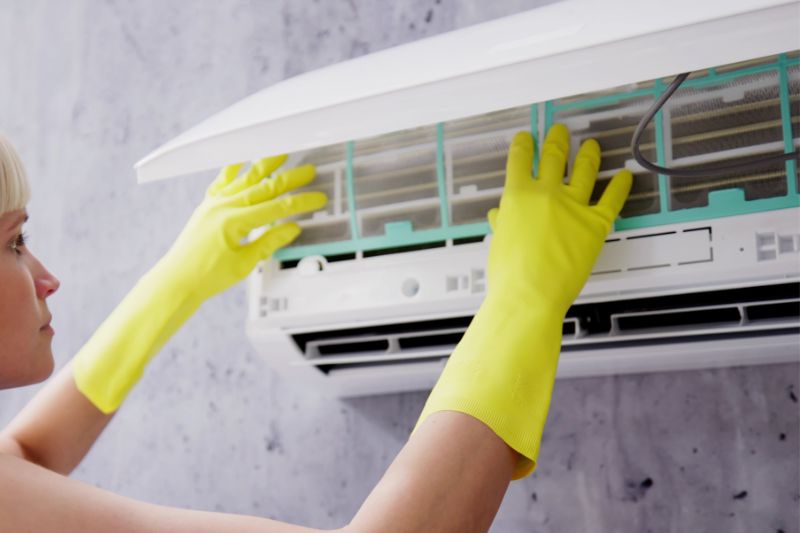
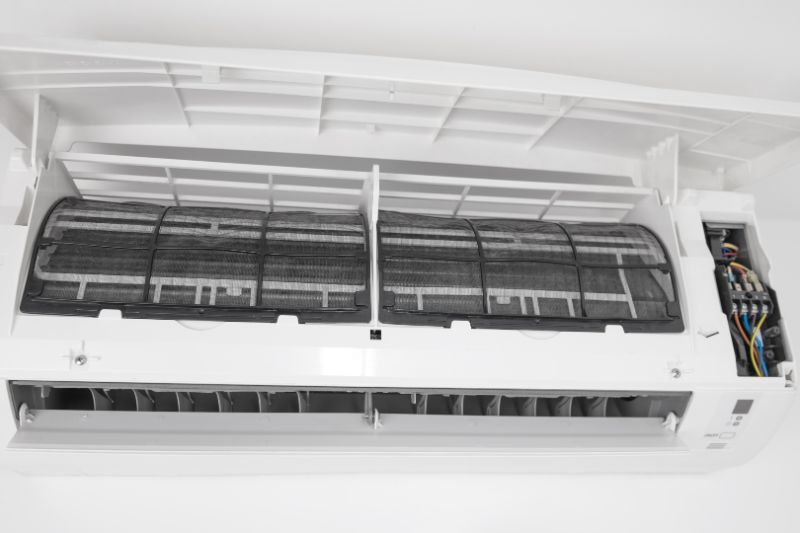
Got Questions? Call Now To Get Answers
The Role of Air Duct Cleaning in AC Efficiency
Air duct cleaning plays a critical role in the efficiency and longevity of your air conditioning system. Over time, dust, pollen, and other debris accumulate within your ducts, reducing airflow and forcing your AC to work harder to cool your home. Here’s why regular duct cleaning is essential for maintaining your AC’s efficiency, and how it’s connected to effective air conditioning repair and residential heating repair services.
1. Improved Airflow and System Efficiency
When ducts are clean, air can flow freely throughout your home. Unrestricted airflow allows the AC to cool your space faster and more evenly, helping to reduce energy consumption. Clogged ducts, on the other hand, create obstructions that force the system to work harder. Over time, this strain on the AC system can lead to inefficiencies and more frequent needs for air conditioning repair.
2. Reduced Wear and Tear on the AC Unit
Dust and debris in the ducts do more than just restrict airflow; they can also infiltrate the internal components of your AC unit. This buildup causes the AC to run longer cycles to achieve the desired temperature, leading to wear and tear on critical components like the blower motor and coils. Routine duct cleaning can reduce this strain, helping to extend the lifespan of your system and potentially reducing the need for costly repairs.
3. Better Indoor Air Quality for Healthier Living Spaces
Clean ducts mean cleaner air circulating through your home, which is especially important for households with individuals who suffer from allergies, asthma, or other respiratory issues. Removing allergens, pet dander, and other pollutants from ducts not only improves indoor air quality but also supports overall AC performance, as the system doesn’t have to work as hard to filter the air. If you notice a sudden decline in air quality, consider an inspection or air conditioning repair to assess if ducts or filters need attention.
4. Lower Energy Bills
When your ducts are clean and the AC doesn’t need to work overtime to circulate air, you’ll notice a decrease in energy consumption. According to the EPA, efficient duct systems can improve energy efficiency by up to 20%. Clean ducts lead to shorter cooling cycles and reduced energy usage, resulting in lower energy bills for homeowners. This makes duct cleaning an effective way to keep your AC system’s operational costs down while supporting energy efficiency.
5. Prevention of System Overheating
Obstructed ducts cause the AC to work harder than necessary, which can lead to overheating. Overheated systems are more likely to experience breakdowns, requiring immediate air conditioning repair services. Routine duct cleaning can prevent this by allowing your AC to operate at optimal temperatures, reducing the risk of sudden malfunctions or failures that disrupt your comfort.
6. Consistency in Both Cooling and Heating Performance
A well-maintained duct system benefits not only your air conditioning but also your heating system. In homes with central HVAC systems, ductwork is shared between heating and cooling components, so any blockages in the ducts can impact residential heating repair needs as well. Clean ducts support efficient air circulation throughout the year, whether you’re cooling your home in summer or heating it in winter.
7. Prolonging the Need for Repairs and Replacements
In addition to improving efficiency, regular duct cleaning can help extend the time between major repairs and replacements. Dust and debris can lead to premature wear, making your AC system more likely to need frequent servicing. By keeping ducts clean, you reduce strain on the entire HVAC system, allowing it to last longer before needing replacement. If any major issues do arise, consulting a residential heating repair or air conditioning repair professional can help you address them quickly.
8. Optimal Performance of HVAC Upgrades
If you’ve invested in recent upgrades or new components for your AC or heating system, clean ducts can enhance the effectiveness of those upgrades. For instance, if you’ve installed a new, energy-efficient AC unit, clean ductwork ensures you get the most out of your investment. Clean ducts allow your system to operate as efficiently as it was designed to, further supporting the impact of any upgrades.
Routine air duct cleaning is a practical way to enhance your AC’s efficiency, reduce energy costs, and improve indoor air quality. For comprehensive maintenance, reach out to a qualified air conditioning repair or residential heating repair specialist who can assess your system, identify any airflow issues, and keep your home comfortable year-round.
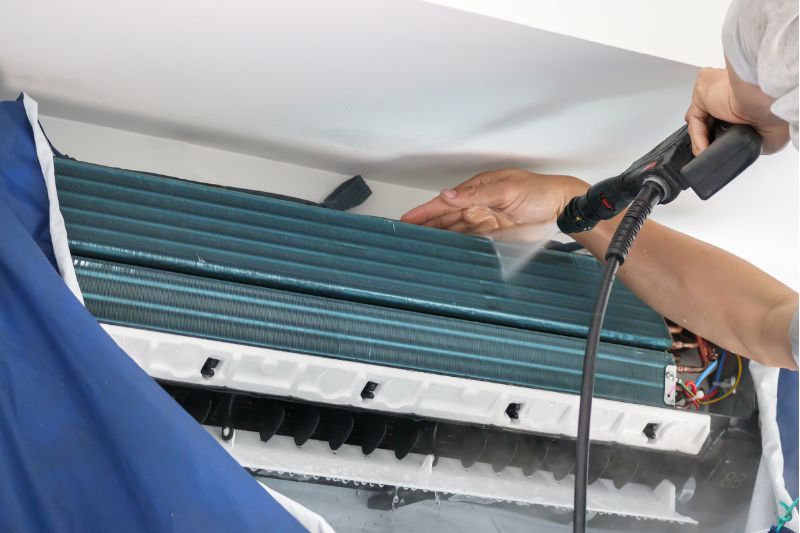
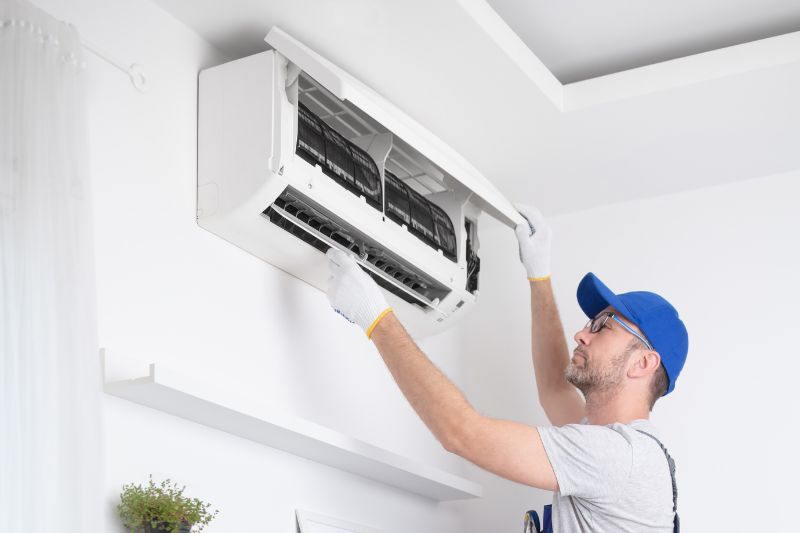
Got Questions? Call Now To Get Answers
Energy-Saving Tips Through AC Maintenance
Reducing energy use while keeping your space comfortable is possible with strategic AC maintenance. By optimizing your AC system’s performance, you’ll not only lower energy bills but also reduce the need for emergency commercial HVAC repair in both home and business settings. Here are practical, energy-saving tips through regular AC maintenance.
1. Clean and Replace Air Filters Regularly
Dirty filters restrict airflow, making your system work harder and consume more energy. Replacing or cleaning filters every month can reduce energy use by up to 15%. In commercial buildings, clogged filters often lead to increased commercial HVAC repair needs because systems must compensate for airflow reduction, which stresses internal components.
2. Schedule Professional Inspections and Tune-Ups
Annual AC tune-ups are essential for energy efficiency. An HVAC technician can inspect components, clean coils, and lubricate moving parts to ensure smooth operation. Regular inspections catch minor issues before they lead to major repairs. Businesses, in particular, benefit from professional maintenance as it helps avoid unexpected commercial HVAC repair costs and keeps energy expenses manageable.
3. Optimize Thermostat Settings
Raising the thermostat by a few degrees can make a big difference in energy savings without sacrificing comfort. In commercial spaces, consider a programmable thermostat to set temperatures for different times of day, like reducing cooling overnight when the building is empty. This reduces energy waste and helps keep your AC system in top shape longer.
4. Seal Duct Leaks and Insulate
Duct leaks force your AC to work harder, as cool air escapes before reaching its destination. Properly sealed and insulated ducts help maintain consistent temperatures and reduce energy consumption. This is especially critical in larger buildings where leaks can lead to extensive energy loss and increased demand for commercial HVAC repair.
5. Keep Outdoor Units Clean and Clear
Outdoor AC units need proper airflow to function efficiently. Remove debris, dirt, and plants around the unit to prevent obstructions that could impede performance. When airflow is restricted, the system must use more energy, resulting in higher bills and the potential for mechanical issues that lead to commercial HVAC repair needs.
6. Use Ceiling Fans to Circulate Air
Ceiling fans help distribute cool air more evenly, allowing you to raise the thermostat without losing comfort. This is particularly beneficial in commercial buildings with high ceilings or open layouts. Fans reduce the workload on the AC system, allowing it to operate more efficiently and with less strain.
7. Check Refrigerant Levels
Insufficient refrigerant levels force the AC to work harder, reducing efficiency and increasing energy costs. A professional HVAC technician can check and replenish refrigerant as needed to keep your system functioning at its best. Proper refrigerant levels also help prevent costly commercial HVAC repair by reducing strain on the compressor and other critical components.
8. Install Blinds or Shades to Minimize Heat Gain
Blocking direct sunlight can keep indoor temperatures cooler, allowing your AC to use less energy to maintain a comfortable environment. In commercial spaces, installing reflective window films or shades can reduce cooling needs significantly, especially in rooms or offices with large windows.
9. Upgrade to Energy-Efficient AC Units
If your system is outdated, consider upgrading to a more energy-efficient model. Modern AC units consume less energy and have higher SEER (Seasonal Energy Efficiency Ratio) ratings, which means better performance at a lower operational cost. This investment can result in substantial energy savings over time, and it’s often less expensive than frequent commercial HVAC repair on an older, inefficient system.
10. Implement a Zoned Cooling System
Zoning divides a building into multiple cooling areas, each with its own thermostat. This setup allows you to cool only the spaces in use, reducing energy consumption. Zoned cooling is particularly beneficial in commercial spaces where different areas have varying occupancy levels. Reducing unnecessary cooling in low-use areas saves energy and reduces stress on the AC unit, prolonging its life and lowering the frequency of commercial HVAC repair needs.
Through regular maintenance and mindful usage, you can keep your AC system running efficiently while keeping energy costs down. These tips are effective for both residential and commercial properties, ensuring that your AC system delivers the cooling you need without excessive energy waste. For more comprehensive support, consult with a commercial HVAC repair expert to optimize your AC system’s performance year-round.
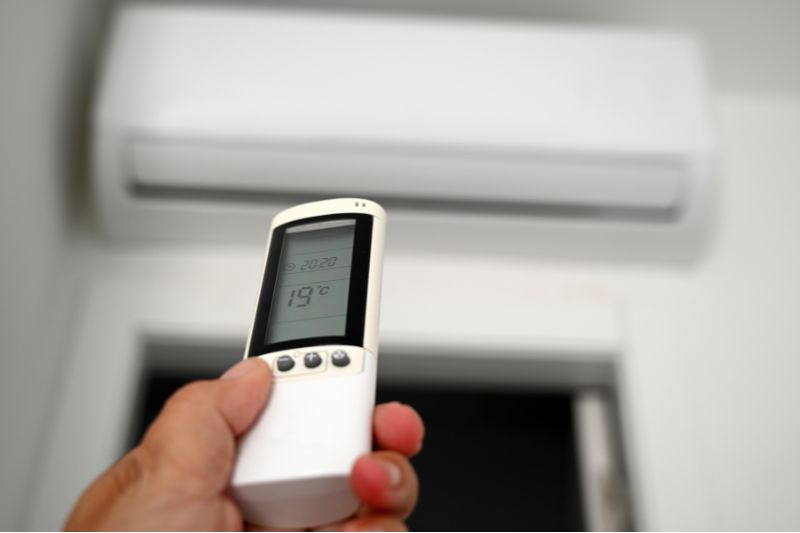
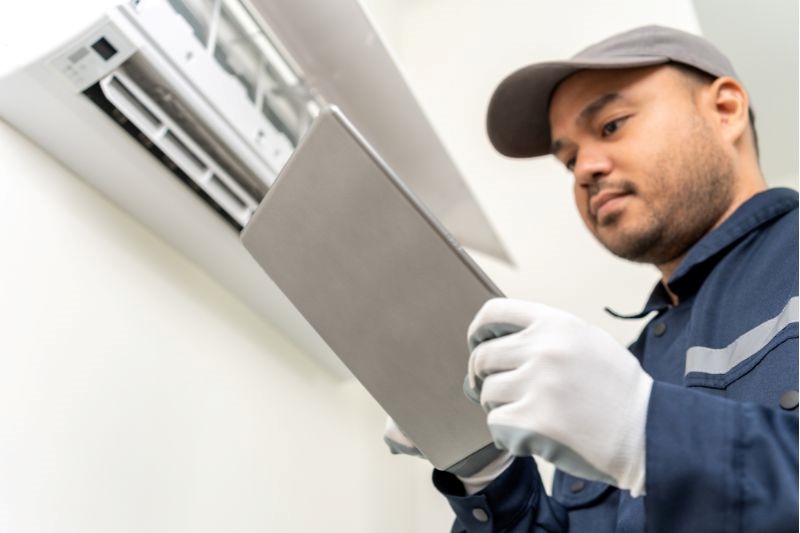
Got Questions? Call Now To Get Answers
Impact of Smart Thermostats on AC Performance
Smart thermostats are transforming the way we manage indoor climates, with significant impacts on AC performance and energy efficiency. These devices bring advanced temperature control, automation, and remote accessibility, allowing users to manage cooling more precisely. Here’s how smart thermostats enhance AC performance and benefit both residential and commercial properties.
1. Enhanced Energy Efficiency
One of the biggest advantages of smart thermostats is their ability to adjust temperature settings automatically based on your preferences, habits, and even the time of day. They can be programmed to maintain higher temperatures when no one is home, reducing the workload on the AC system and saving energy. This optimized performance leads to lower energy bills and less wear on the AC system over time.
2. Remote Control and Adjustments
With smart thermostats, users can monitor and control AC settings remotely via smartphone apps. This is especially helpful for those who travel frequently or manage multiple properties. If you forget to adjust the thermostat before leaving, you can make changes on the go, ensuring your AC only operates when necessary. This remote accessibility helps avoid unnecessary cooling, minimizing energy use and strain on the system.
3. Learning Capabilities and Predictive Adjustments
Many smart thermostats come with learning algorithms that analyze your routines and adjust temperature settings automatically. After observing daily patterns, the thermostat can adjust the AC at specific times to suit your comfort needs without constant manual input. This predictive adjustment supports consistent AC performance without frequent system cycles, which can reduce energy use and lower maintenance costs.
4. Improved System Lifespan
By reducing the number of cycles your AC system runs, smart thermostats help extend the lifespan of key components like compressors and fans. Constantly turning the AC on and off puts strain on these parts, leading to faster wear. With smart, consistent temperature adjustments, the thermostat keeps the system running at optimal levels, reducing the likelihood of mechanical breakdowns and prolonging the system’s life.
5. Temperature Zoning for Larger Spaces
Smart thermostats can also integrate with zoning systems, allowing you to control temperatures in different rooms or zones independently. In large homes or commercial buildings, zoning reduces energy use by cooling only the areas that need it. This customization prevents your AC system from working harder than necessary to cool unused spaces, optimizing energy efficiency and enhancing overall performance.
6. Detailed Energy Reports and Insights
Many smart thermostats provide real-time data on energy usage, helping you understand how and when your AC system uses the most energy. These reports show trends that can reveal opportunities for better efficiency, such as identifying peak cooling times and adjusting settings to reduce energy waste. These insights can help you make more informed decisions about how you use your AC, ultimately improving performance and saving energy.
7. Seamless Integration with Smart Home Systems
Smart thermostats often integrate with other smart home devices, allowing for coordinated cooling control. For example, smart blinds or shades can be programmed to close during peak sunlight hours, reducing the temperature indoors and lowering the demand on your AC. With this integration, smart thermostats not only enhance AC performance but also contribute to an overall energy-efficient home environment.
8. Automatic Maintenance Alerts
Many smart thermostats offer proactive maintenance reminders, alerting users when it’s time to change filters, check the system, or schedule a professional inspection. These alerts can help prevent issues that affect AC performance, such as clogged filters or worn components, allowing you to take preventive steps before small problems become costly repairs. Staying on top of maintenance keeps the AC system efficient and reliable year-round.
9. Environmental Benefits and Energy Savings
Using a smart thermostat reduces energy consumption, which lowers greenhouse gas emissions. By running the AC only when necessary and at optimal levels, users reduce their carbon footprint. This benefit is valuable for environmentally-conscious homeowners and businesses that want to contribute to sustainability goals while also cutting down on operational costs.
10. Increased Comfort with Less Effort
Lastly, smart thermostats optimize comfort by maintaining consistent indoor temperatures that adapt to changes in weather or occupancy. You can set desired temperatures for different times of day, and the thermostat does the work of maintaining them seamlessly. For example, cooling can begin automatically before you arrive home, so it’s comfortable right when you walk in, without the system running unnecessarily during the day.
Conclusion
Smart thermostats provide an effective way to improve AC performance by reducing energy consumption, enhancing comfort, and prolonging system life. With automated adjustments, zoning capabilities, and easy-to-access data, smart thermostats bring a new level of efficiency to heating and cooling management. Whether for a home or commercial property, installing a smart thermostat is a worthwhile investment to maximize AC performance while saving on energy costs and reducing environmental impact.
Got Questions? Call Now To Get Answers
Reach Us
Heating and Air Conditioning Repair – Atlanta, GA
Hours of Operation
Mon Open 24 hours
Tue Open 24 hours
Wed Open 24 hours
Thu Open 24 hours
Fri Open 24 hours
